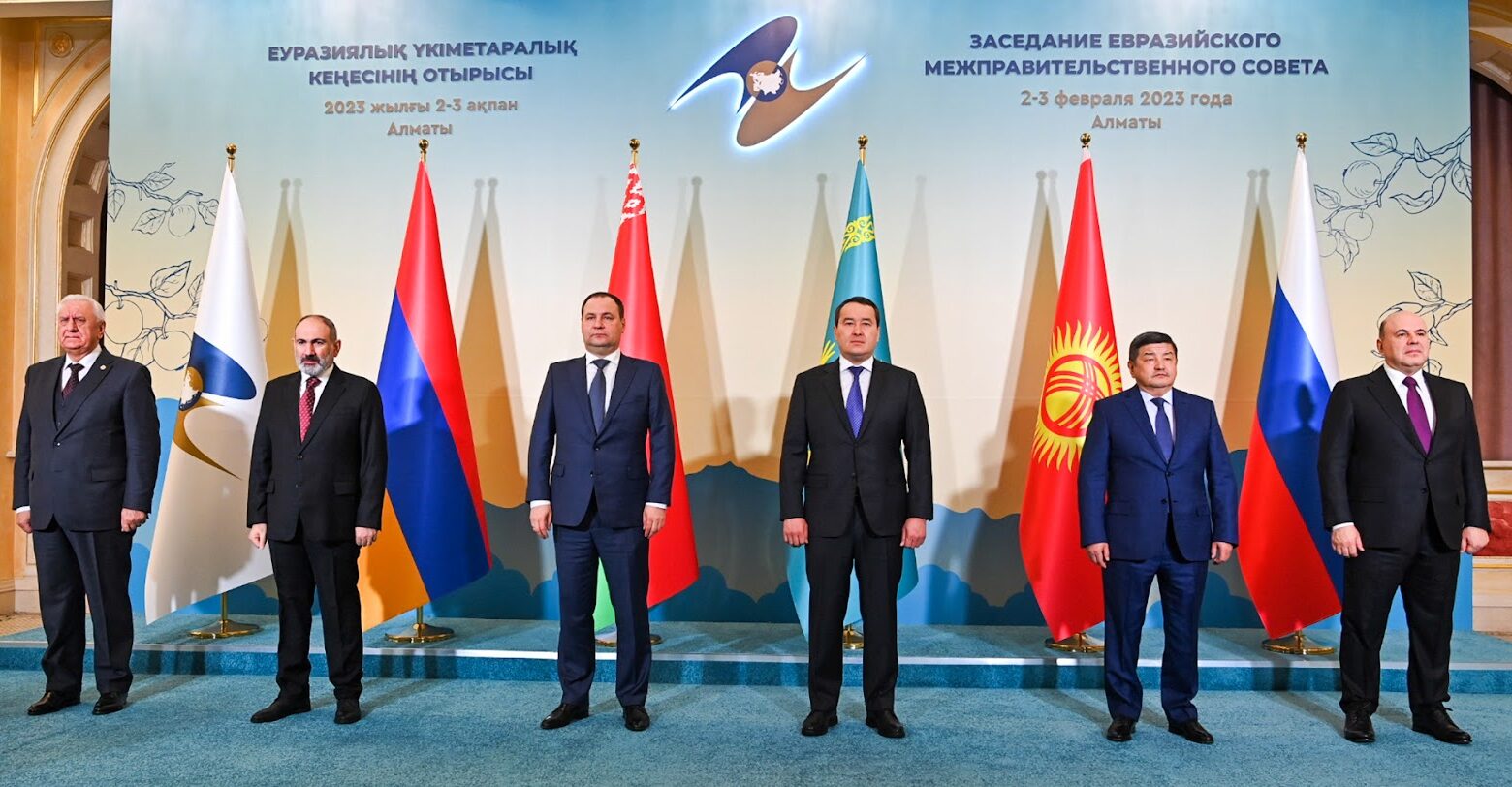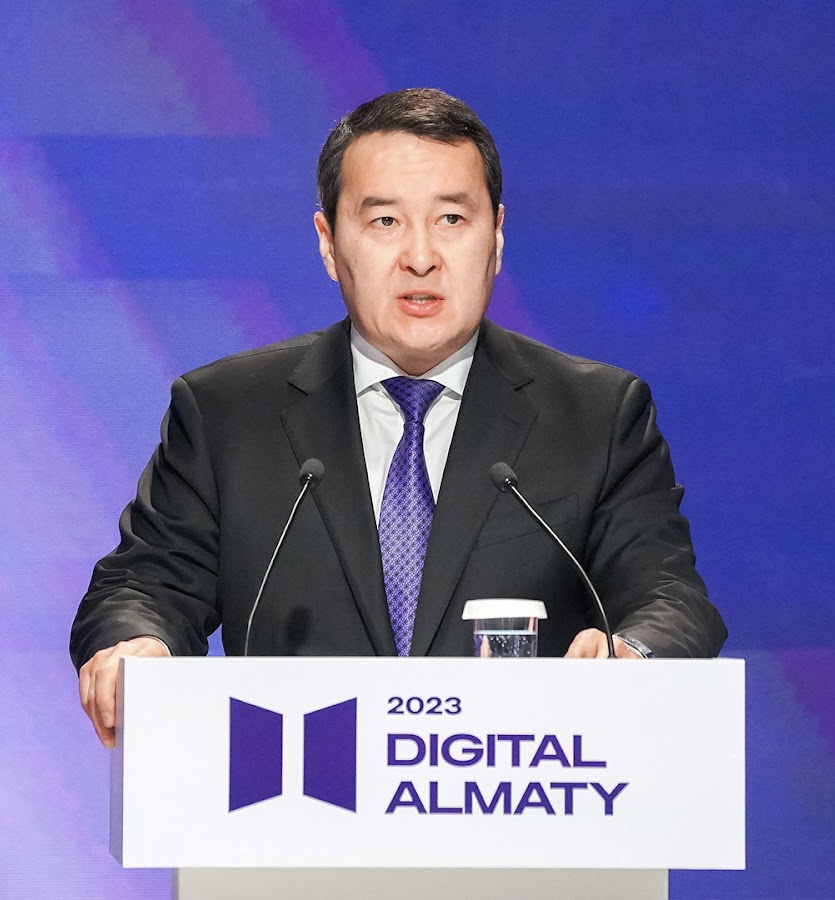ASTANA – The heads of government of the Eurasian Economic Union (EAEU) countries addressed the possibility of removing digital barriers between EAEU member states, as well as introducing innovative solutions in trade and key global technological trends during the Digital Partnership in New Reality plenary session at the Digital Almaty International forum on Feb. 3, the Prime Minister’s press service reported.

Chairman of the Board of the Eurasian Economic Commission (EEC) Mikhail Myasnikovich, Prime Minister of Armenia Nikol Pashinyan, Prime Minister of Belarus Roman Golovchenko, Prime Minister of Kazakhstan Alikhan Smailov, Chairman of Cabinet of Ministers and Head of Presidential Administration of Kyrgyzstan Akylbek Japarov, Chairman of the Russia Government Mikhail Mishustin. Photo credit: Prime Minister’s press service.
Prime Minister of Armenia Nikol Pashinyan, Prime Minister of Belarus Roman Golovchenko, Prime Minister of Kazakhstan Alikhan Smailov, Chairman of the Cabinet of Ministers and Head of Presidential Administration of Kyrgyzstan Akylbek Japarov, Chairman of the Russian Government Mikhail Mishustin and Prime Minister of Uzbekistan (EAEU observer state) Abdulla Aripov attended the event.
While speaking at the plenary meeting, Smailov said Kazakhstan pursues a policy of digital transformation of the public administration, which includes implementing FinTech and GovTech projects. Owing to the openness of the state and the adaptability of business, the country enjoys the benefits of these new digital technologies in everyday life, Smailov said.
“Digitalization is important in ensuring equal opportunities and justice for all citizens of the country,” he added.

Prime Minister of Kazakhstan Alikhan Smailov. Photo credit: Prime Minister’s press service.
According to Smailov, the Kazakh government is switching to a qualitatively new concept of digitalization for its public administration where a person, their needs, and interests are at the center of state policy. As a result, this propels the introduction of proactive public services.
“This implies the multi-platform principle of service provision. The state is moving away from the bottleneck model, allowing businesses to integrate public services into their own platforms and digital ecosystems. The advantage of this approach is obvious,” Smailov said.
In recent years, Kazakhstan has made significant progress in e-government development, Smailov said. In the United Nations (UN) ranking, the country improved its position significantly, rising from 39th to 28th place (since 2018), and in the sub-ranking of online services, it entered the top 10 list of countries, rising from 16th to 8th place.
The Prime Minister also focused on enhancing the quality and accessibility of communications services, developing cross-border electronic document management, strengthening integration, and creating joint projects in the Eurasian space. He proposed to open a Digital Competence Center in Almaty, which would become a platform for forming and implementing major digital initiatives within the EAEU.
On Feb. 2, the heads of EAEU governments discussed further economic cooperation within the EAEU space at the Eurasian Intergovernmental Council meeting.
The meeting participants discussed the regulation of the EAEU alcohol market, progress made in preparing a draft international agreement on forming a common gas market, and the activities of the union’s regional development institutions.

The heads of government of the Eurasian Economic Union (EAEU) countries at the Digital Almaty International forum on Feb. 3. Photo credit: Prime Minister’s press service.
“I am confident the adopted decisions make a significant contribution and give a new impetus to the development of our integration association,” Smailov said, addressing the EAEU partners.
On the first day of the forum, Kazakhstan Temir Zholy (KTZ), the national railway company, signed an agreement on a pilot project with Documentolog Global Limited. This partnership will make it possible to automate processes related to document management, optimizing the work of human resources and financial services.
Also, KTZ signed a memorandum of understanding with Network Access Associates Ltd. (OneWeb) to improve the quality of communication on the railways.
According to Anuar Akhmetzhanov, Deputy Chairman for Strategy and Digitalization of the KTZ Management Board, cooperation with OneWeb will allow for the possibility of high-speed serial connection to ensure the digitalization of railway infrastructure, including railway stations, seaports, ships, and rolling stock along transport corridors.

